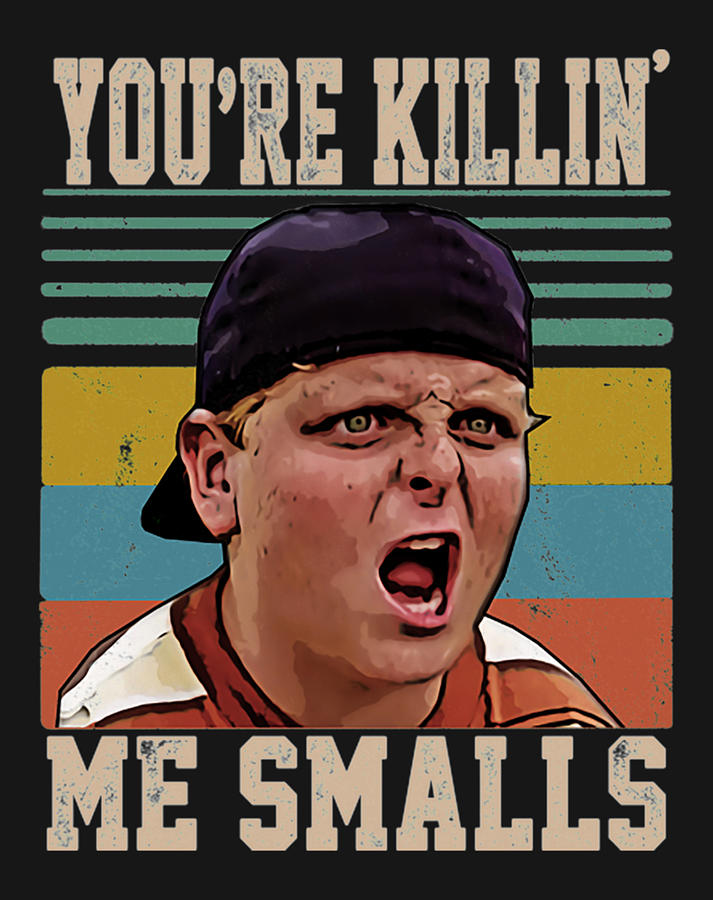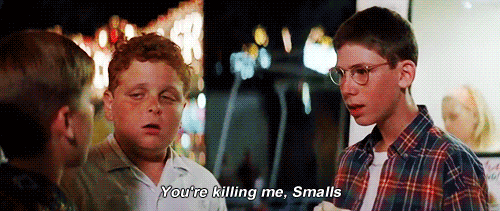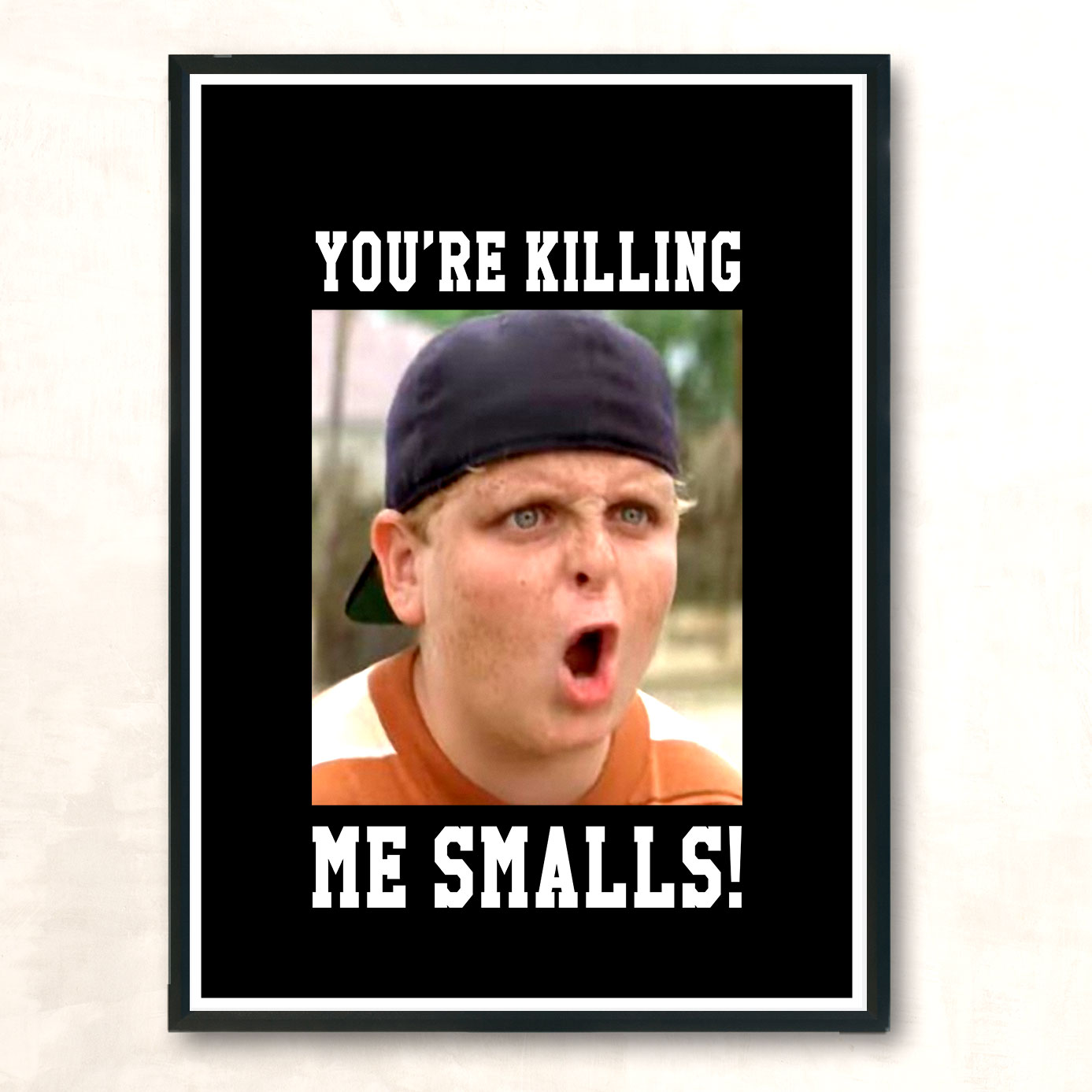You're Killing Me Smalls - The Enduring Sayings
There are some sayings, you know, that just stick around, finding their way into everyday talks and becoming a regular part of how we express ourselves. It's almost as if they've always been there, really, popping up when we least expect them, yet somehow making perfect sense for the moment. These bits of language, you see, often come from places we might not even recall, like a favorite movie or a classic song, but their impact on how we chat with each other is quite something to behold.
One such phrase, often heard when someone feels a bit put out or completely exasperated with another person's actions, is that line, "You're killing me, Smalls." It's a saying that, for many, brings a chuckle or a knowing nod, even if they can't quite place its start. This particular bit of dialogue, you know, carries a very specific kind of frustration, a feeling of being totally fed up with someone who just doesn't seem to get it, or who acts a little clueless in a situation.
So, where did this iconic line come from, and why does it still resonate with so many folks? Well, it actually sprang from a much-loved film from the early nineties, a story about summer days, baseball, and growing up. The movie gave us this saying, and it pretty much took on a life of its own, becoming a familiar way to show that you're just about at your wit's end with someone, usually in a lighthearted, yet very clear, manner. It's truly a classic, in some respects.
Table of Contents
- Where Did "You're Killing Me, Smalls" Come From?
- What Does "You're Killing Me, Smalls" Mean?
- The Scene That Made "You're Killing Me, Smalls" Famous
- Why Do People Still Say "You're Killing Me, Smalls"?
- The Making of a Classic Film and "You're Killing Me, Smalls"
- Beyond the Screen: How "You're Killing Me, Smalls" Lives On
- The S'more Moment and "You're Killing Me, Smalls" Legacy
- The Lasting Impact of "You're Killing Me, Smalls"
Where Did "You're Killing Me, Smalls" Come From?
The saying, "You're killing me, Smalls," has a very specific birthplace: the 1993 film called The Sandlot. This movie, you know, tells a wonderful story about a group of young boys and their summer adventures playing baseball. It's a movie that, for many, brings back fond memories of childhood and simpler times. The line itself comes from a moment in the film that's both funny and, well, a little bit frustrating for one of the characters. It's a very memorable bit of talking, that's for sure.
The film, which first appeared in the United States on April 7, 1993, quickly became a favorite for families and anyone who loves a good story about growing up. It's about a new boy in town, Scottie Smalls, who tries to fit in with a group of kids who are really good at baseball. He doesn't know much about the game at first, and that's where some of the best moments, including this famous line, come from. The movie, honestly, just has a special charm to it.
The character who utters this memorable bit of speech is Ham Porter, played by Patrick Renna. Ham is one of the more outspoken and, you could say, a bit boisterous boys on the team. He's got a big personality, and he's usually pretty direct about what he thinks. It's his reaction to Smalls's lack of certain common knowledge that brings about the line that so many people now repeat. It's a pretty classic setup, in a way.
The director, David Mickey Evans, helped shape these moments, making them truly stand out. The actors, including Tom Guiry as Smalls and Patrick Renna as Ham, brought these young characters to life in a way that felt very real and very funny. The story itself is about a new boy, Scottie Smalls, who gets taken under the wing of a young baseball star and his spirited team. Their summer is full of many happenings, and this particular line is just one of the shining parts of their time together, you know.
What Does "You're Killing Me, Smalls" Mean?
When someone says, "You're killing me, Smalls," they are typically showing a strong sense of being completely fed up with another person or with a particular situation. It's a way of expressing a feeling of great annoyance or frustration. It's not meant to be taken literally, of course, but it really gets at that feeling of, "Oh, come on! You've got to be kidding me!" It's a very common way to show exasperation, you know, when someone just isn't getting it.
This phrase is often directed at someone who seems to have a certain lack of skill or who is, for all intents and purposes, a bit out of touch with what's going on. You might use it when someone acts a little bit clueless, or when they just don't seem to grasp something that seems quite simple to you. It's that feeling of, "How can you not know this?" but said in a way that's more playful than truly angry. It's a pretty good way to put things, if you ask me.
Think about a time when you've explained something very clearly, perhaps several times, and the other person still looks at you with a blank stare. Or maybe they do something that seems to go against all common sense. That's the sort of moment where "You're killing me, Smalls" fits just right. It's a way to let out that little sigh of annoyance, that feeling of being a bit overwhelmed by someone else's, well, slowness to understand. It's a very relatable feeling, I think.
The phrase can be used in many different everyday situations. Perhaps a friend asks a question you just answered. Or maybe someone makes a really obvious mistake. In those moments, rather than getting truly upset, you might just shake your head and say, "You're killing me, Smalls." It's a way of saying, "You're making this much harder than it needs to be," but with a touch of humor. It's almost a gentle scolding, in a way, but still very clear about your feelings.
The Scene That Made "You're Killing Me, Smalls" Famous
The famous line, "You're killing me, Smalls," comes from a particular scene in The Sandlot that is, you know, just perfect. The boys are having a sleepover in their tree house, and they're getting ready to tell Smalls a scary story about a creature known as "The Beast." But before any tales can be spun, a kid, as they say, has to eat. This is where the whole thing begins, really.
Ham Porter, the character with the big personality, offers Smalls a treat. He asks him, "Hey, you want a s'more?" Smalls, being the new kid and a bit sheltered, looks confused. He replies, "No, do you want a s'more?" This response, you see, completely throws Ham off. Smalls then adds, "I haven't had anything yet, so how can I have some more of nothing?" This is the moment that really sets Ham off, in a pretty funny way.
Ham's reaction to Smalls's complete lack of knowledge about s'mores is what gives us the classic line. He's utterly baffled that someone, especially a kid, wouldn't know what a s'more is. It's like a fundamental piece of childhood information, to him. So, in a burst of exasperation, he throws his hands up and says, with all the feeling in the world, "You're killing me, Smalls!" It's a moment that, you know, just captures the essence of that kind of friendly frustration.
What follows is Ham's patient, yet somewhat dramatic, explanation of how to make a s'more. He describes the process step by step: "First, you take the graham. You stick the chocolate on the graham. Then, you roast the 'mallow." He's basically giving a cooking lesson in the middle of a tree house campout, all because Smalls has never heard of this simple, delicious treat. It's a truly memorable sequence, and it really shows the difference in their experiences, too.
The S'more Moment and "You're Killing Me, Smalls" Legacy
The s'more scene is more than just a funny bit of dialogue; it's a moment that really helps define the characters and their relationships. It highlights Smalls's innocence and his unfamiliarity with common kid experiences, which makes him stand out from the other boys. Ham's reaction, on the other hand, shows his outgoing nature and his slight impatience with anyone who isn't up to speed on the important things in life, like camp snacks. It's a very telling exchange, actually.
The simplicity of the s'more, a treat made from graham crackers, chocolate, and roasted marshmallows, makes Smalls's confusion even funnier. It's such a basic, beloved part of many childhoods, especially during summer campouts. The idea that someone could reach a certain age without knowing about it is, for Ham, almost unbelievable. This contrast is what makes the line, "You're killing me, Smalls," so effective and so often repeated. It captures that feeling of gentle disbelief, you know.
This particular part of the film has become a touchstone for many people. It's often brought up when talking about the movie, or when explaining the phrase itself. The imagery of the boys in the tree house, the campfire glow, and the simple act of making a s'more, all contribute to the warmth and charm of the scene. It's a really sweet and funny moment that, in some respects, just captures the spirit of being a kid.
The way Ham explains the s'more, with such earnestness and a bit of a dramatic flair, is also a big part of why the scene is so beloved. He's not just telling Smalls; he's practically giving a master class in s'more construction. This dedication to such a simple pleasure, coupled with his exasperation, makes the entire interaction truly special. It’s a moment that, you know, just sticks with you long after the movie ends.
Why Do People Still Say "You're Killing Me, Smalls"?
The enduring popularity of "You're killing me, Smalls" comes from its sheer relatability and its comedic timing. It's a phrase that, you know, perfectly captures a feeling that almost everyone has experienced: that moment of utter exasperation with someone who just doesn't seem to get it. Whether it's a small misunderstanding or a bigger blunder, the line just fits, offering a lighthearted way to express frustration without truly being angry. It's pretty versatile, in a way.
The phrase is also very memorable because of its specific origin. Even if people don't know it comes from The Sandlot, the way it's said, with the direct address to "Smalls," gives it a unique rhythm and punch. It's not just a general expression; it feels personal, even when you're saying it to someone who isn't actually named Smalls. That personal touch, you see, makes it feel more engaging and less generic than other ways of showing annoyance.
Part of its staying power is also tied to the movie itself. The Sandlot has become a true classic, often watched by new generations who then pick up on the line. It's a film that speaks to universal themes of childhood, friendship, and summer fun, making it something that many people can connect with. As long as the movie is watched and enjoyed, the line, you know, will likely continue to be used and passed along.
Furthermore, the phrase is a fantastic example of how a specific piece of dialogue can transcend its original context and become part of everyday conversation. It's short, punchy, and delivers its message clearly. It’s a bit of a shorthand for a complex feeling, allowing people to express a mix of annoyance, disbelief, and a touch of affection, all at once. It's truly a testament to good writing and acting, I think.
The Making of a Classic Film and "You're Killing Me, Smalls"
The Sandlot, the film that brought us "You're killing me, Smalls," is itself a well-loved piece of cinema. Directed by David Mickey Evans, the movie captures the spirit of the summer of 1962, a time of innocence and simple joys. The story follows Scottie Smalls, played by Tom Guiry, as he moves to a new town and tries to find his place. It's a story that, you know, many people can relate to, especially if they've ever been the new kid.
The film is filled with a cast of young actors who brought their characters to life with a lot of energy and heart. Besides Tom Guiry as Smalls and Patrick Renna as Ham, the movie also features Mike Vitar, who plays Benny "The Jet" Rodriguez, the baseball prodigy who takes Smalls under his wing. The chemistry among the boys is a big part of what makes the movie so enjoyable and so enduring. They really feel like a real group of friends, actually.
The story itself is quite straightforward: a new boy learns to play baseball, makes friends, and has a series of adventures with his team. But it's the small moments, the everyday interactions, and the genuine feelings of childhood that truly make the movie special. The humor comes from the situations the boys find themselves in, and from their distinct personalities. The line, "You're killing me, Smalls," is just one shining example of this kind of natural, relatable comedy. It's pretty well done, if you ask me.
The movie's appeal also comes from its nostalgic feel. It transports viewers back to a time when summer days seemed to stretch on forever, filled with outdoor games and simple pleasures. This sense of longing for a bygone era, combined with the timeless themes of friendship and growing up, helps ensure that The Sandlot remains a favorite for many years after its release. It's a very comforting kind of film, you know.
Beyond the Screen: How "You're Killing Me, Smalls" Lives On
The phrase "You're killing me, Smalls" has truly taken on a life of its own, moving far beyond the movie screen and becoming a part of everyday conversation and online culture. It's a clear example of how a simple line from a film can become a widely recognized expression, even for people who have never seen the movie. This widespread use is, you know, quite remarkable.
One of the ways this phrase stays relevant is through animated images and short video clips. With tools that let people easily share quick moving pictures, bits of "You're killing me, Smalls" from the movie scene are often used in chats and on social media. These quick visual bits help keep the line fresh in people's minds and introduce it to new groups of people. It's a pretty neat way for things to spread, actually.
These short visual clips, often called GIFs, are a very popular way to express feelings quickly in digital conversations. When someone sends a GIF of Ham Porter saying "You're killing me, Smalls," it immediately conveys that feeling of exasperation or playful annoyance without needing to type out a long explanation. It's a very efficient and, you know, often humorous way to communicate, making the phrase even more accessible.
The phrase has also found its way into other forms of popular culture, from references in TV shows to use in advertisements. Its simple yet powerful message, combined with its humorous origin, makes it a versatile saying that can be applied to many different situations. It's a testament to how deeply ingrained certain movie quotes can become in our collective way of speaking. It really is a lasting part of our shared language, I think.
The Lasting Impact of "You're Killing Me, Smalls"
The enduring popularity of "You're killing me, Smalls" speaks to the power of well-crafted dialogue and the lasting impact of beloved films. It's a phrase that, you know, continues to bring smiles and nods of recognition, serving as a quick, funny way to express a common human feeling. Its journey from a specific movie scene to a widely used saying shows how culture can shape our everyday talks.
The line's success is not just about its comedic value, but also its ability to capture a universal feeling of exasperation in a lighthearted manner. It allows people to voice their frustration without being overly harsh, making it a friendly way to point out someone's cluelessness or a situation's absurdity. This blend of humor and genuine feeling is, you know, what gives it such staying power.
Moreover, the phrase acts as a cultural touchstone, connecting people across different generations who either grew up with The Sandlot or discovered it later. It's a shared reference point that can spark conversations and bring a sense of camaraderie among those who recognize it. It’s a very good example of how movies can truly affect the way we talk and interact, actually.
From its humble beginnings in a tree house campout scene, "You're killing me, Smalls" has grown into a true icon of popular language. It reminds us of the simple joys of childhood, the bonds of friendship, and the hilarious moments that come from misunderstandings. It's a saying that, you know, will likely continue to be passed down and enjoyed for many more years to come, a testament to its simple charm and widespread appeal.

You're Killing Me Smalls Digital Art by William Stratton

“You’re Killing Me Smalls” (The Sandlot) | Gifrific

You're Killing Me Smalls Huge Wall Poster - Aestheticlux.com